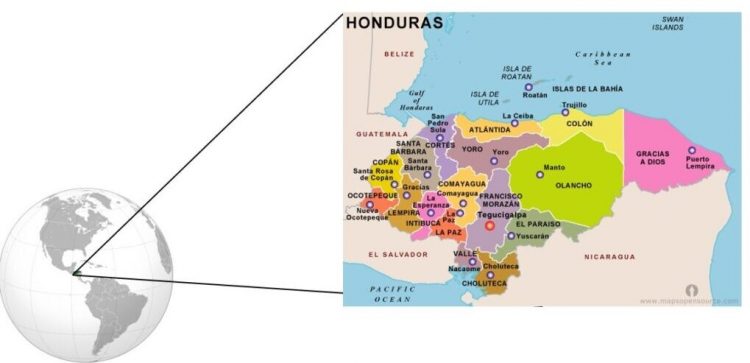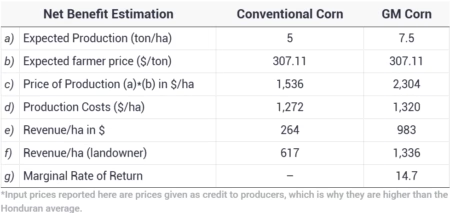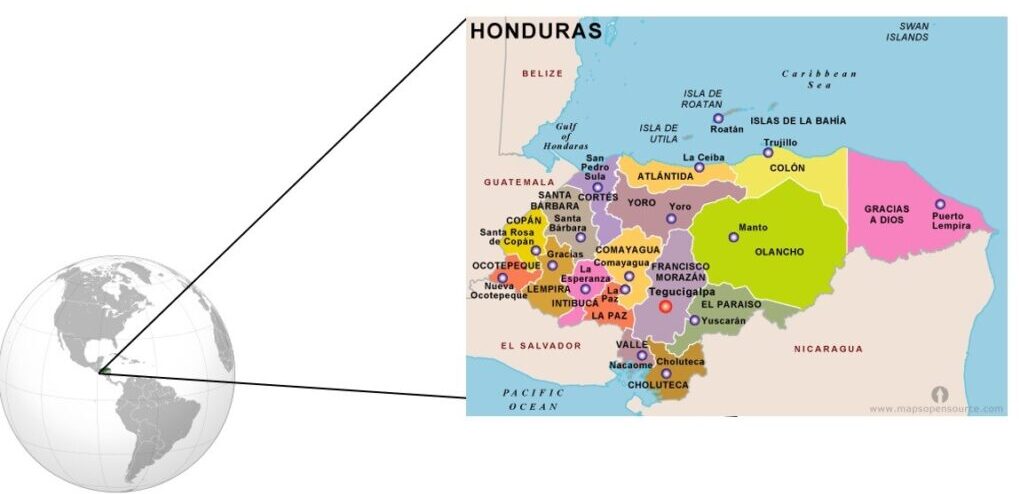
Honduras is a small Central American country of 112,492 km2 (one-sixth the size of Saskatchewan), with a population of 9.5 million people (nearly 9 times the population of Saskatchewan). Translated from Spanish to English the name of the country literally means ‘valleys.’ One can easily imagine how difficult agriculture must be when you are surrounded by mountains (rarely will you find a flat piece of land) and with arable land accounting for less than 10% of the country. And because it’s a tropical nation, they are under constant threat of pests, and new pests are beginning to affect their crop production. This becomes a major food security issue for Hondurans because corn provides 26% of the calories consumed by urban-dwelling Hondurans and 48% of the calories for rural-dwelling Hondurans. The threat of food security is mitigated thanks to Honduras’ 2002 support and adoption of science-based innovations and adopted genetically modified (Bacillus thuringiensis-Bt) corn to help guarantee their yearly corn crop.
Bt Corn Impacts in Honduras Initially
Falck-Zepeda et al. (2012) were among the first to comprehensively assess Bt and glyphosate-tolerant (RoundUp ReadyTM) corn impacts in Honduras. That analysis showed that Bt corn yields were 856–1,781 kg/ha higher than conventional corn production, that’s a 60% – 130% increase over the 1961-2012 Honduran average (Figure 1). Adopters of these GM crop crops achieved higher net incomes than non-adopters, despite GM seed being twice as costly as conventional hybrid seed. It’s been eight years since this publication and over a decade since the survey data was collected (2007-2008), so what has happened since?

Source: FAOSTAT, 2020
What is happening with Bt Corn now?
More than a decade after that survey, the long-term farm-level impacts of GM corn in Honduras have remained unexplored. Until now. Dr. Smyth & I partnered with colleagues from Zamorano University (Honduras) and the Technological Institute of Costa Rica to investigate the farm-level impacts of Bt corn adoption in Honduras more than a decade after the initial survey was undertaken (2018-2019). A total of 32 farmers (prior study surveyed 113 farmers) that produce both conventional and GM corn, and have participated in past research activities with the University were surveyed. You might think that is a small sample, and it is, but keep in mind that this country’s name is ‘valleys.’ So, what has the impact of Bt corn over the past decade been? The most significant impact of adopting this GM technology has truly been remarkable.

By cultivating GM corn, Honduran farmers expect a 50% increase in yield over conventional corn. Farmers that use Bt corn can expect twice the revenue per hectare than conventional corn producers. Farmers that embrace GM technology can also expect to not have to spray pesticides to protect their corn crops at all. So why has adoption of this crop remained so stubbornly low (around 20% of overall corn planted)? There are many reasons, but one of the main ones is that the Honduran government has simply not been a better communicator of the technology and its benefits. Remember, logistics are tricky, and the word doesn’t get around as quickly about technologies. Farmers are also less likely to gamble on something new (Bt Corn) or unknown if their food for one year depends on it.
So, what can we say about Bt Corn in Honduras?
Over the past decade, GM corn continues to outperform conventional corn hybrids, and provide substantial farm-level benefits to Honduran farmers. Without question, producing Bt corn in Honduras requires a higher investment per hectare than conventional corn. However, the return on investment for Bt corn is considerably higher than that of conventional corn. If the Honduran government established an extension service capable of instructing corn farmers throughout the country on the technology’s impacts, the benefits could be greater.
Macall, D.M., Trabanino, C.R., Soto, A.H. et al. Genetically modified maize impacts in Honduras: production and social issues. Transgenic Res 29, 575–586 (2020). https://doi.org/10.1007/s11248-020-00221-y


